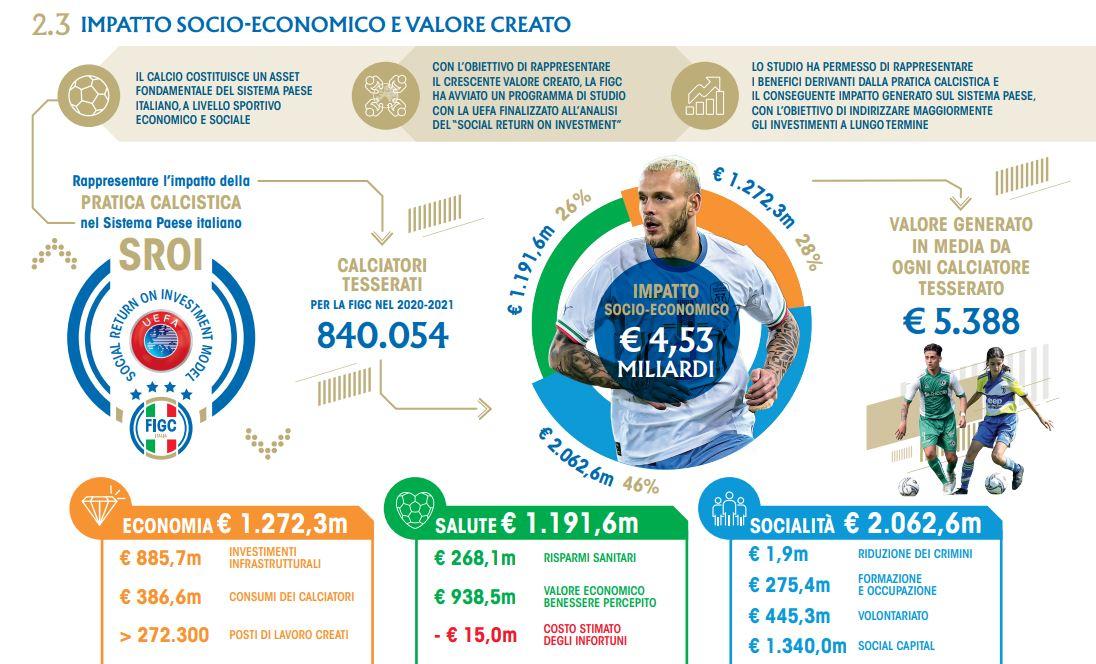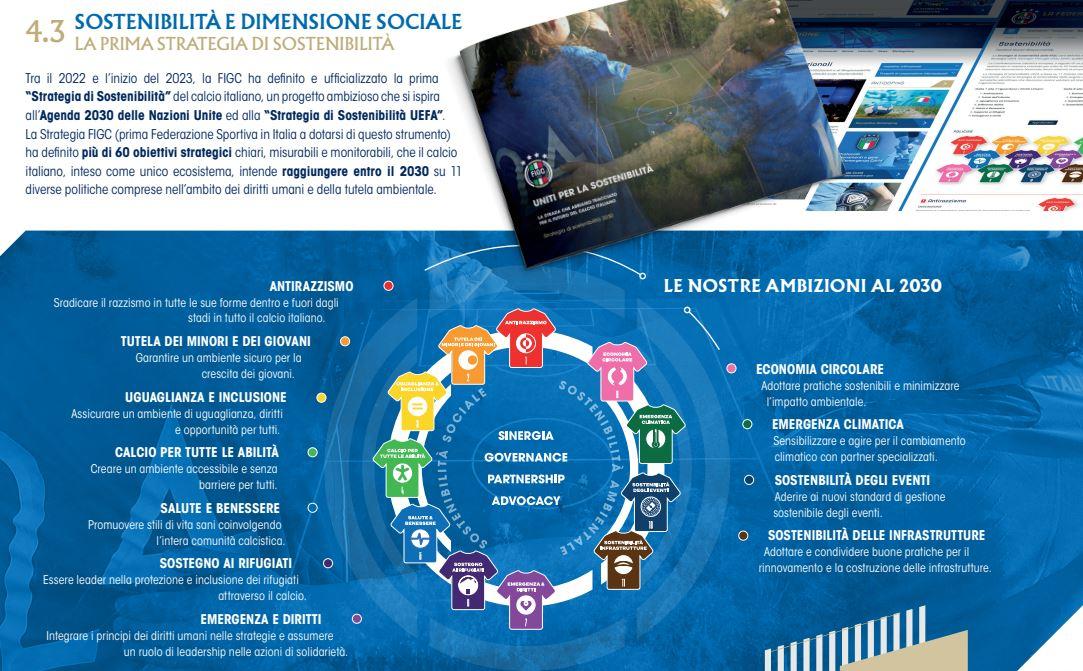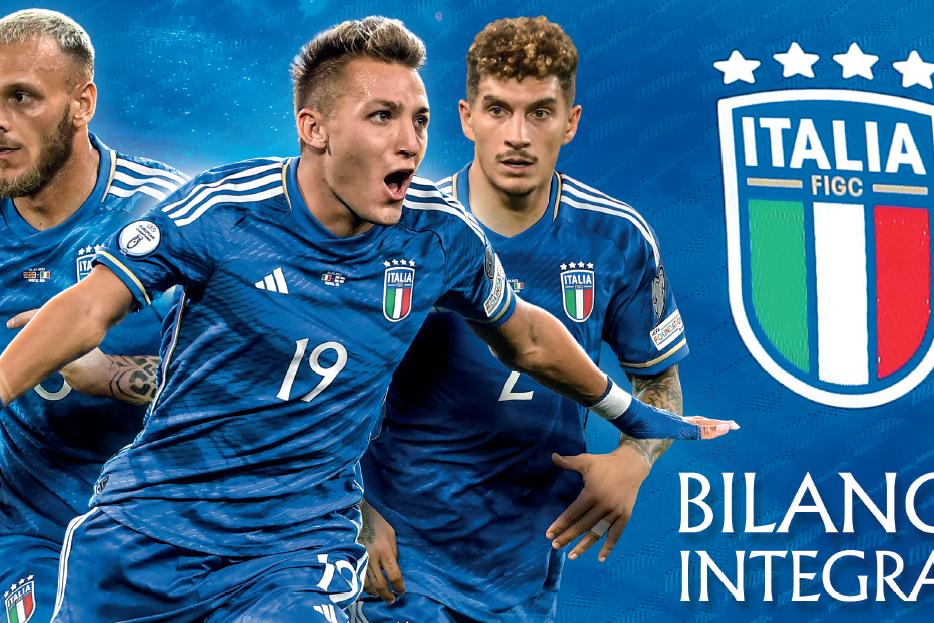PHOTO
The 'Integrated Report' 2022 has been published on the FIGC website, representing the evolution of the Social Report and outlining the Federation's key strategic programmes. A document highlighting the transparency journey undertaken by the FIGC, now in its twelfth consecutive year of accountability and reporting. Among the topics covered are the sustainability strategy adopted by the Federation, the development of youth and women's football, facilities, and major sports events. It also delves into the social dimension, providing a comprehensive overview of inclusion programmes, the fight against racism and match-fixing, and the growth of the Paralympic and Experimental Football Division. Numerous data and figures paint a picture of the state of Italian football, confirming its status as a strategic asset for the country.
"The Integrated Report is the ideal tool to explore the lesser-known side of football, the one that is closest to my heart," said FIGC President Gabriele Gravina. "It details the Federation's cross-cutting activities in the field of comprehensive sustainability. The implementation of educational and social projects reveals the true face of Italian football: increasingly inclusive, sensitive, and responsible, supporting the youth and the vulnerable through initiatives that positively impact local communities. The spotlight of show business and excessive controversies on and off the field distort the image of a reality that, on the contrary, operates with an extraordinary impact on diverse communities, representing a driver of civic engagement that enhances Italy."


Football-related numbers once again testify to the sport's status as the main Italian sports system in terms of social impact, generated interest, and economic and fiscal reflections. There are 4.6 million practitioners and almost 1.4 million FIGC members (the Football Federation would now represent the third "municipality" in Italy in terms of population), including over a million players, a figure returning to pre-COVID19 levels (+210,000 registered players in just one sports season). Italy hosts nearly 500,000 official matches annually on over 13,000 playing fields, producing a socio-economic impact on strategic sectors of the economy, social life, and health amounting to 4.53 billion euros. Football continues to be one of Italians' great passions, with 57% of the population expressing interest in the sport, an estimated total of nearly 34 million people. Among the top 50 most-watched television programmes in Italian TV history, only football matches are present (including 47 matches of the National Team).
Football activity is also an increasingly relevant industrial sector in our country; total direct revenues amount to 5 billion euros. Considering the indirect and induced impact produced on the 12 product sectors involved in the football value activation chain, the impact on the Italian GDP is estimated at over 11.1 billion euros, with almost 126,000 jobs activated. The fiscal and social contribution of top-level football (Serie A, B, and C) in 2020 exceeded 1.3 billion euros. The 99 professional football clubs account for 73.1% of the contribution to the Italian sports sector (50,000 companies and entities), a record incidence since 2015. Over the last 15 years, for every euro "invested" by the Italian government in football, the country has received a return in fiscal and social terms equal to €18.9.
With these extraordinary numbers in mind, on a federal governance level, the aim is to accompany the football system on a path of sustainable development. The goal is to assert and enhance the increasingly crucial role that football can play as a strategic asset to support the growth of Italian sports and the entire country system, creating value on a sporting, economic, and social level. Notably, the FIGC was the first federation globally to launch a dedicated Paralympic and Experimental Football Division, aimed at athletes with cognitive-relational difficulties. Since 2019, this initiative has represented a cultural change, involving over 3,000 members and 104 participating clubs, with significant growth potential for the future (in Italy, there are over 700,000 people with mental health issues who are assisted by specialist services).


This aspect was further explored in the recent presentation of the FIGC's first Sustainability Strategy, aligned with the UEFA Sustainability Strategy "Strength Through Unity 2030", to which the entire European football community is required to adhere. 69 clear, measurable, and monitorable strategic objectives inspired by the United Nations Agenda 2030, covering 11 different policies related to human rights and environmental protection. In this strategy, inclusion programmes, the fight against racism, and all forms of discrimination play an increasingly significant role, enriching the educational and social commitment of the FIGC and Italian football. Specifically, Italian football represents an important and growing tool for social integration, with nearly 70,000 members born abroad (coming from over 140 nations), including 17,641 foreign minors upon their first registration, and over 44,000 Youth and School Sector members.
The significant growth in recent years, especially from the African continent - a reflection of the the increase in migration flows - has confirmed football's important role as a positive factor of inclusion. This is evident from numerous projects developed by the FIGC in relation to this matter, starting with the "RETE! - Refugee TEams" project, which involves the organisation of sports and socio-educational activities for unaccompanied foreign minors and and young adults seeking international protection. This project is an international best practice that has involved a total of 6,050 boys over a period of 8 years, with the numbers consistently growing edition after edition. Sporting activities are complemented by educational initiatives aimed at the staff of reception centers and the participating boys and girls. In addition to REfugee TEams, the FIGC has also pursued numerous other inclusion programmes, particularly those related to recent humanitarian emergencies, including those in Afghanistan and Ukraine.
The FIGC's social responsibility programme is multi-faceted: support for fundraising campaigns, such as AIRC's "Un Goal per la Ricerca", the development of socially relevant campaigns, and the provision of contributions (from 2015 to 2022, total donations amount to over 1.3 million euros). This is in addition to the supply of materials. For instance, regarding the humanitarian emergency in Ukraine, the FIGC donated sports equipment to the Italian Red Cross (over 10,000 items worth over 220,000 euros). The Federation was involved in the 2023 humanitarian peace mission, donating 24,000 National Team garments, valued at 400,000 euros.
In terms of ongoing collaborations, a best practice is the synergy established since 2015 and consolidated in subsequent years with the Bambino Gesù Paediatric Hospital of the Holy See. This collaboration has materialised with substantial economic contributions and several meetings between National Team players and young patients, providing intense moments of sharing, emotion, joy, and emotion. Special attention has also been given to the most disadvantaged areas of our cities, where football can increasingly represent a factor of redemption and social recovery. An example is the Roman neighborhood of Corviale, which, thanks to the FIGC's economic support, quickly benefited from the building of a new sports facility ("Campo dei Miracoli", inaugurated by President Mattarella). Continuing with youth-oriented social initiatives, the "Zona Luce" project, carried out in collaboration with the Scholas Occurrentes Pontifical Foundation, promotes and implements sports activities aimed at protecting and strengthening the educational, moral, and cultural value of football. This project is intended for Penitentiary Police Operators and Detainees in youth detention facilities in Nisida (Naples), Casal del Marmo (Rome), and Milan.
